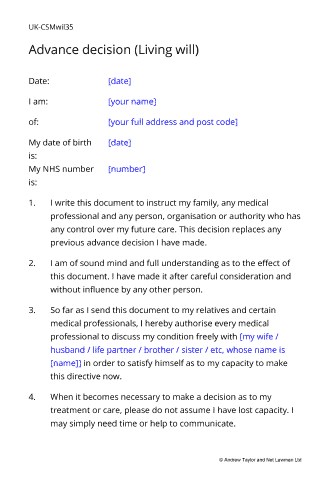Advance decision (Living will)

Document overview

 England & Wales
England & Wales

- Length:2 pages (500 words)
- Available in:
 Microsoft Word DOCX
Microsoft Word DOCX Apple Pages
Apple Pages RTF
RTF

If the document isn’t right for your circumstances for any reason, just tell us and we’ll refund you in full immediately.

We avoid legal terminology unless necessary. Plain English makes our documents easy to understand, easy to edit and more likely to be accepted.

You don’t need legal knowledge to use our documents. We explain what to edit and how in the guidance notes included at the end of the document.

Email us with questions about editing your document. Use our Lawyer Assist service if you’d like our legal team to check your document will do as you intend.

Our documents comply with the latest relevant law. Our lawyers regularly review how new law affects each document in our library.
What is an advance decision?
Advance decisions (also called living wills, advanced directives, and advance decision to refuse treatment) allow you to refuse life-sustaining treatment should you no longer be able to make decisions about your healthcare.
Through your advance decision, you can inform your family, carers and health professionals about your decision to refusing treatment.
An advance decision is usually used when your condition is likely to be permanent. Your refusal of medical treatment is legally binding on any doctor in England and Wales.
While you may also request life-sustaining treatment, no matter what your prospects of recovery, doctors do not have to respect these requests. They are already obliged to act in your best interests.
When should you write a living will
You can make a living will at any time provided you are over 18 years of age. You do not need to have, or suspect you have, a medical condition or be close to not being able to not being able to communicate your wishes.
So as to prevent your advance decision being challenged, it is important that no-one can claim that you were influenced in your decision to make it by anyone else - particularly by anyone that might stand to benefit from your death. It is therefore advisable that you don't discuss your advance decision with family or friends before you have signed it under witness. Of course, once you have made an advance decision, you should tell them your wishes and give them a copy of the advance statement.
You do, however, need to have mental capacity - to understand, remember and make use of information relating to your decision and the consequences of it. A medical doctor is the best person to certify whether you have that capacity when writing your advance decision. Therefore, we recommend that your GP or another doctor that knows you acts as your witness to your advance decision
What can't you specify in an advance decision?
You can't use a living will to:
- refuse basic treatment
- ask for specific medical treatment, such as use (or not) of a particular drug;
- request help to die (whether by assisted suicide or euthanasia);
- nominate someone else to take decisions on your behalf about what treatment you should have.
Is advance statement different from advance decision?
Yes.
An advance decision clarifies the circumstances under which you do not wish to receive life sustaining treatment.
In contrast, advance statements set out how you want to cared for if, due to lack of mental capacity, you are unable to express your preferences. For example, certain people may not be able to intake certain food due a religious reason.
Are living wills legally binding?
Your advance decision may or may not be legally binding. This largely depends upon the actual request you make in your advance decision.
To ensure that your advance decision is binding, it should
- comply with the requirements of the Mental Capacity Act
- be valid
- be relevant to the situation you are in
For an advance decision to be valid:
- you must be aged 18 or over and have the capacity to make, understand, and communicate your decision concerning which treatment you should recieve if you become seriously ill.
- your advance decision must clearly stipulate which treatments you want to refuse
- your advance decision should be specific about the circumstances in which you wish to refuse medical treatment
- your advance decision must be signed by you and one witness that has nothing to gain from your death
- your advance decision must be made of your own accord
- your advance decision must include a clear statement that you want it to apply even if as a result of its application your life might be at risk

Recent reviews
All rights reserved
